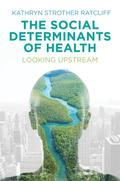The Social Determinants of Health
Looking Upstream

1. Auflage September 2017
256 Seiten, Hardcover
Wiley & Sons Ltd
Kurzbeschreibung
This timely book takes seriously the idea of understanding how our social world - and not individual responsibility or the healthcare system - is the primary determinant of our health. Kathryn Strother Ratcliff puts into practice the "upstream" imagery from public health discourse, which locates the causes (and solutions) of health problems within the social environment. Each chapter explains how the policies, politics, and power behind corporate and governmental decisions and actions produce unhealthy circumstances of living - such as poverty, pollution, dangerous working conditions, and unhealthy modes of food production - and demonstrates that putting profit and politics over people is unhealthy and unsustainable. While the book examines how these unhealthy conditions of life generate significant class and ethnic health disparities, the focus is on everyone's health. Arguing that none of us should be placed in health-threatening situations that could have been prevented, Ratcliff's provocative analysis uses social justice and human rights lenses to guide the discussion "upstream," toward possible changes that should produce a healthier world for us all. Using data and ideas from many disciplines, the book provides a synthesis of invaluable information for activists and policymakers, as well as for professionals and students in sociology, public health, and other fields related to health.
This timely book takes seriously the idea of understanding how our social world - and not individual responsibility or the healthcare system - is the primary determinant of our health. Kathryn Strother Ratcliff puts into practice the "upstream" imagery from public health discourse, which locates the causes (and solutions) of health problems within the social environment. Each chapter explains how the policies, politics, and power behind corporate and governmental decisions and actions produce unhealthy circumstances of living - such as poverty, pollution, dangerous working conditions, and unhealthy modes of food production - and demonstrates that putting profit and politics over people is unhealthy and unsustainable. While the book examines how these unhealthy conditions of life generate significant class and ethnic health disparities, the focus is on everyone's health. Arguing that none of us should be placed in health-threatening situations that could have been prevented, Ratcliff's provocative analysis uses social justice and human rights lenses to guide the discussion "upstream," toward possible changes that should produce a healthier world for us all. Using data and ideas from many disciplines, the book provides a synthesis of invaluable information for activists and policymakers, as well as for professionals and students in sociology, public health, and other fields related to health.
Chapter Two: Social Determinants of Health
Chapter Three: Poverty and Health
Chapter Four: Environmental Health
Chapter Five: Water and Health
Chapter Six: Automobiles and Health
Chapter Seven: Occupational Health
Chapter Eight: Food and Health
Chapter Nine: Conclusion
References
Index
Professor Mary Zimmerman, University of Kansas School of Medicine
"What we breathe in, eat, and drink; where we work and live; how we travel - each, done badly, can damage health. Kathryn Strother Ratcliff takes us on a wonderfully informative journey to examine the governmental and industrial causes of exposures that determine health."
Professor Sir Michael Marmot, Chair of the World Health Organization's Commission on Social Determinants of Health (2005-2008)


